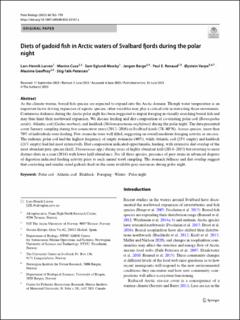| dc.contributor.author | Larsen, Lars-Henrik | |
| dc.contributor.author | Cusa, Marine Lure Joana | |
| dc.contributor.author | Eglund-Newby, Sam | |
| dc.contributor.author | Berge, Jørgen | |
| dc.contributor.author | Renaud, Paul Eric | |
| dc.contributor.author | Varpe, Øystein | |
| dc.contributor.author | Geoffroy, Maxime | |
| dc.contributor.author | Falk-Petersen, Stig | |
| dc.date.accessioned | 2023-08-10T08:36:44Z | |
| dc.date.available | 2023-08-10T08:36:44Z | |
| dc.date.created | 2023-07-07T13:27:43Z | |
| dc.date.issued | 2023 | |
| dc.identifier.issn | 0722-4060 | |
| dc.identifier.uri | https://hdl.handle.net/11250/3083297 | |
| dc.description.abstract | As the climate warms, boreal fish species are expected to expand into the Arctic domain. Though water temperature is an important factor driving expansion of aquatic species, other variables may play a critical role in restricting those movements. Continuous darkness during the Arctic polar night has been suggested to impair foraging in visually searching boreal fish and may thus limit their northward expansion. We discuss feeding and diet composition of co-existing polar cod (Boreogadus saida), Atlantic cod (Gadus morhua), and haddock (Melanogrammus aeglefinus) during the polar night. The data presented cover January sampling during five consecutive years (2012–2016) in Svalbard fjords (78–80°N). Across species, more than 70% of individuals were feeding. Few stomachs were well filled, suggesting an overall moderate foraging activity or success. The endemic polar cod had the highest frequency of empty stomachs (40%), while Atlantic cod (25% empty) and haddock (21% empty) had fed most extensively. Diet composition indicated opportunistic feeding, with extensive diet overlap of the most abundant prey species (krill, Thysanoessa spp.) during years of highly abundant krill (2014–2015) but reverting to more distinct diets in a year (2016) with lower krill abundance. For all three species, presence of prey items in advanced degrees of digestion indicated feeding activity prior to each annual trawl sampling. The stomach fullness and diet overlap suggest that coexisting and similar sized gadoids feed on the same available prey resources during polar night. | en_US |
| dc.language.iso | eng | en_US |
| dc.publisher | Springer | en_US |
| dc.rights | Navngivelse 4.0 Internasjonal | * |
| dc.rights.uri | http://creativecommons.org/licenses/by/4.0/deed.no | * |
| dc.title | Diets of gadoid fish in Arctic waters of Svalbard fjords during the polar night | en_US |
| dc.type | Journal article | en_US |
| dc.type | Peer reviewed | en_US |
| dc.description.version | publishedVersion | en_US |
| dc.rights.holder | Copyright The Author(s) 2023 | en_US |
| cristin.ispublished | true | |
| cristin.fulltext | original | |
| cristin.qualitycode | 1 | |
| dc.identifier.doi | 10.1007/s00300-023-03167-z | |
| dc.identifier.cristin | 2161432 | |
| dc.source.journal | Polar Biology | en_US |
| dc.source.pagenumber | 783–799 | en_US |
| dc.identifier.citation | Polar Biology. 2023, 46, 783–799. | en_US |
| dc.source.volume | 46 | en_US |

